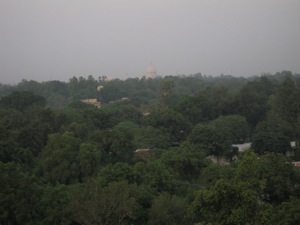Semester at Sea Fall
2006 Voyage 
The Transnational in India
By Reck
The transnational moment is making a real impact on present day India. India is still growing at an outstanding rate population wise, but has also begun growing economically. Their large population of English speaking persons has enabled them to become a huge outsourcing resource for the English speaking western world, largely the United States.
 What
really surprised me to learn was that the call center
jobs are
highly prized positions. That was not how I pictured them. But from
what I learned in Sonali Gulati's film Nalini by Day, Nancy by Night they are high
paying jobs, in nice business type settings. The impact it has on life
in India is pretty intense still. The hundreds of thousands of people
staffing the American call centers in India still work 9-5 jobs in one
sense, it just ends up 9-5 Eastern Standard Time. So about 12 hours off
from "normal" working hours in India. Despite the obvious disruption to
daily life working these kind of hours must be, the film shows that
these jobs in the call centers are some of the most highly sought after
jobs in India.
What
really surprised me to learn was that the call center
jobs are
highly prized positions. That was not how I pictured them. But from
what I learned in Sonali Gulati's film Nalini by Day, Nancy by Night they are high
paying jobs, in nice business type settings. The impact it has on life
in India is pretty intense still. The hundreds of thousands of people
staffing the American call centers in India still work 9-5 jobs in one
sense, it just ends up 9-5 Eastern Standard Time. So about 12 hours off
from "normal" working hours in India. Despite the obvious disruption to
daily life working these kind of hours must be, the film shows that
these jobs in the call centers are some of the most highly sought after
jobs in India.
After call centers the only other transnational force I saw at work in India was tourism. I heard that the majority of international tourists that come to India only see the Taj Mahal, and nothing else. This has seriously magnified its importance to India as a whole. Without the Taj Mahal they would not have nearly as many tourists, nor tourist dollars, pounds, or yen.
The importance of
the Taj Mahal as an industry in itself
struck me when I reflected upon something a shopkeeper I met in Agra
told me. He mentioned that the government had prohibited any new
factories in Agra, and possibly removed long standing ones, after they
discovered that the pollution was damaging the Taj Mahal. It is
interesting that the money brought in by the Taj Mahal itself can
outweigh any other industry in the city. Though it also means anyone
who could have been employed in those industries must now make a living
in another manner, most likely off the tourists surrounding them.
The transnational forces in India are numerous and diverse, from
international tourism to international business and call centers for
the western, English speaking world. The vernacular forces of normal
life, societal norms for waking hours, or local industries do not stand
a chance against the influx of tourists and foreign money.